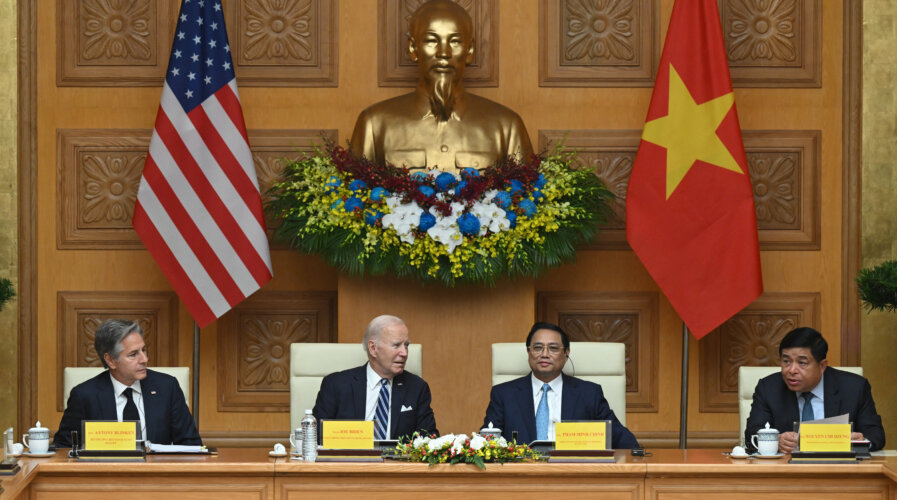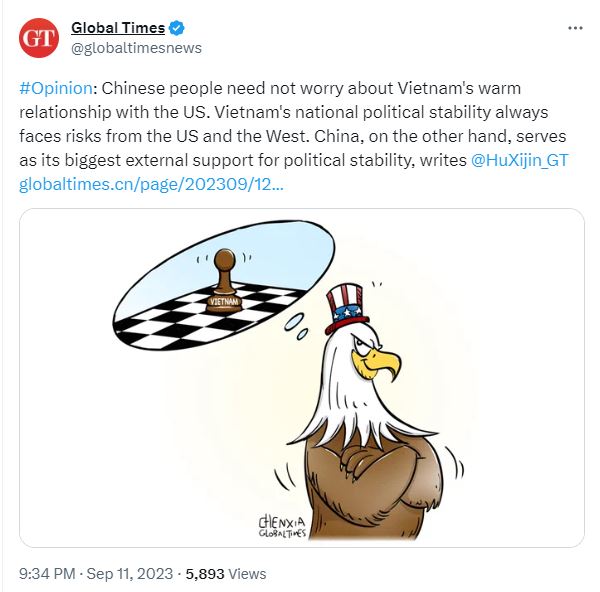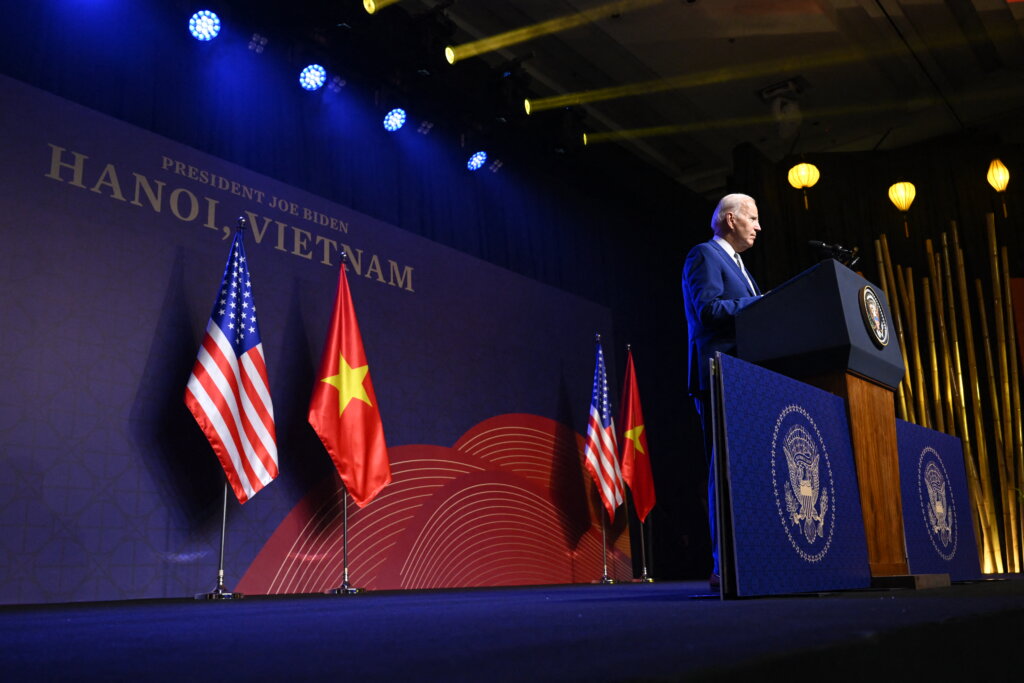
Vietnam’s Prime Minister Pham Minh Chinh, US President Joe Biden and US Secretary of State Antony Blinken (L) hold a meeting with CEOs at the Government Office in Hanoi on September 11, 2023. The United States and Vietnam warned against the “threat or use of force” in the disputed South China Sea, days after the latest clash involving Chinese vessels. (Photo by SAUL LOEB / AFP)
Vietnam could be the answer to U.S. chip supply chain
- U.S. President Joe Biden visited Vietnam after the G20 Summit in India.
- Several U.S. companies signed deals and partnerships worth billions to boost investment in Vietnam.
- The U.S. hopes Vietnam can help it deal with its semiconductor supply chain issues.
Since the Vietnam War, trade and diplomatic relations between the U.S. and Vietnam have not been at their best. For the U.S., doing business with a communist country was historically considered problematic, to say the least. However, things have changed over the last decade, especially with the U.S.–Vietnam Comprehensive Partnership, which was signed a decade ago.
Today, Vietnam is one of the fastest growing economies in Southeast Asia. However, the country is also aware of China’s influence on its trade. Although communist ideology is no longer considered a threat, the U.S. continues to worry about China’s expansion. This concern includes not only China’s territorial claims in the South China Sea, but also its expanding global influence over the world of technology.
Despite U.S. sanctions on its supply chain, China remains a powerhouse in industries ranging from quantum computing and 5G to semiconductors. At the same time, China’s low-cost technology has become a key factor for American businesses. Currently, most large American businesses, such as Tesla and Apple, manufacture their products in China.
However, with increasing pressure from the U.S. on how these companies can continue to operate in China, many are exploring other countries as alternative locations for their manufacturing plants. Both India and Southeast Asia have emerged as likely destinations for American businesses looking to continue their manufacturing operations without significantly impacting their budgets.

The state of US-Vietnam relations draws interested eyes in China.
Improving US-Vietnam relations
While India has proven to be a worthy competitor to China, its geographic location could result in slightly higher supply chain costs. As a result, more American businesses are considering Vietnam as the ideal location for their production facilities and supply chain management.
According to a report by The Financial Times, the U.S. and Vietnam have agreed to strengthen their ties in response to China’s growing influence. American companies signed deals and partnerships worth billions of dollars during U.S. President Joe Biden’s recent visit to the country.
The President visited Vietnam after the G20 Summit in India. The deals and partnerships signed included agreements with Boeing, Microsoft and NVIDIA. NVIDIA will be partnering with FPT, Viettel and Vingroup to deploy AI solutions across the cloud, automotive and healthcare industries. Meta and Microsoft have also partnered with Vietnamese companies to roll out AI software across Vietnam to promote digital transformation.
“We’re deepening our cooperation on critical and emerging technologies, particularly around building a more resilient semiconductor supply chain,” said Biden in a joint press conference late on Sunday with Nguyen Phu Trong, General Secretary of the ruling Communist Party of Vietnam.
“We’re expanding our economic partnership, spurring even greater trade and investment between our nations.”

US President Joe Biden holds a press conference in Hanoi on September 10, 2023, on the first day of a visit in Vietnam. Biden travels to Vietnam to deepen cooperation between the two nations, in the face of China’s growing ambitions in the region. (Photo by SAUL LOEB / AFP)
U.S. and Vietnam semiconductor partnership
The White House affirmed the U.S.’s commitment to increasing support for Vietnam in the training and development of a high-tech workforce. Acknowledging Vietnam’s tremendous potential as a major player in the semiconductor industry, both President Biden and General Secretary Phu Trong expressed their energetic support for the rapid development of Vietnam’s semiconductor ecosystem to improve its position in the global semiconductor supply chain.
“Toward this end, the United States and Vietnam announced the launch of semiconductor workforce development initiatives – supported by initial seed funding of US$2 million from the U.S. government, in conjunction with future Vietnamese government and private sector support,” the White House statement said.
Meanwhile, the U.S. State Department announced its partnership with the Vietnamese Government to explore opportunities for growing and diversifying the global semiconductor ecosystem under the International Technology Security and Innovation (ITSI) Fund, established by the CHIPS Act of 2022.
“Vietnam shows promise as a partner in ensuring the semiconductor supply chain is diverse and resilient. Products ranging from vehicles to medical devices increasingly rely on semiconductors as the building blocks of today’s economy. By building on Vietnam’s existing strengths in assembly, testing, and packaging. This collaboration strives to identify new opportunities that attract industry investments and expand the technical workforces in both countries.
The partnership is beginning with a review of Vietnam’s current semiconductor ecosystem, regulatory framework, and workforce and infrastructure needs. The outcome of this review will inform potential future collaboration on developing this critical sector,” said the State Department.
Several U.S. companies also announced plans to build manufacturing plants in the country. Marvell Technology had already announced plans to build a world-class design center in Ho Chi Minh City, Vietnam in May. The site will be home to advanced semiconductor engineering and will be a top technology workplace for employees to enhance their skills and achieve outstanding career opportunities.
Apart from Marvell, Amkor unveiled a new US$1.6 billion factory in the Bac Ninh Province. The plant will assemble, package and test chips, with operations beginning at the end of 2023. Synopsys will also be starting a design and incubation center in conjunction with Saigon Hi-Tech Park.
U.S.-Vietnam relations – a new chapter?
READ MORE
- Safer Automation: How Sophic and Firmus Succeeded in Malaysia with MDEC’s Support
- Privilege granted, not gained: Intelligent authorization for enhanced infrastructure productivity
- Low-Code produces the Proof-of-Possibilities
- New Wearables Enable Staff to Work Faster and Safer
- Experts weigh in on Oracle’s departure from adland




